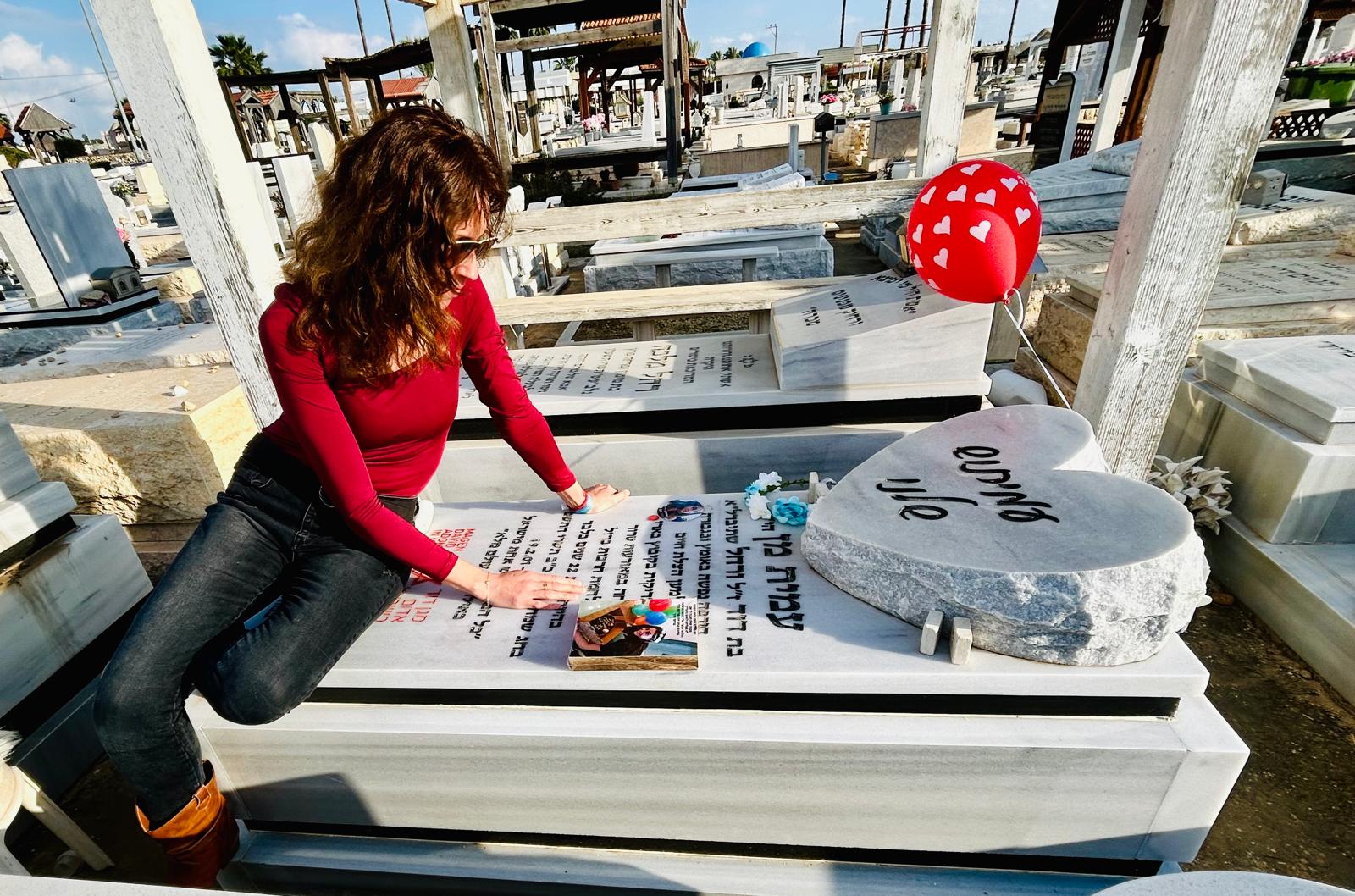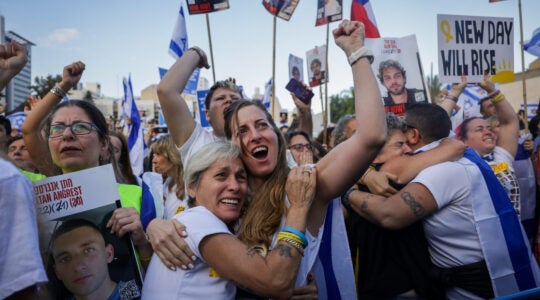TEL AVIV — In the year since her murder by Hamas terrorists on Oct. 7, Amit Mann has taken on near-mythical status as the heroic paramedic who stayed behind in Kibbutz Beeri while rockets rained down in order to save lives; the woman with the voice of the angel who sang a duet posthumously with one of Israel’s biggest rock bands, HaYehudim.
But for her big sister Haviva Izikson, Amit will always remain the way she is described on the heart-shaped headstone next to their father’s, in a plot meant for their grieving mother: “Our Amitush.”
Amit was 22 when she died, one of about 1,200 people in Israel to be killed during the Oct. 7 attack. The story of her last hours ricocheted across a country clinging to narratives of resistance and bravery.
“She turned into a kind of symbol. There’s not a household in Israel who hasn’t heard of Amit, hero of Israel,” Haviva said. “But the pain I feel is for our Amitush, my anonymous baby sister.”
For Haviva, even worse than living in a world without Amit is living in a world in which she has been forgotten.
“My biggest fear is that we’ll get used to a world without her. I can’t accept that. As long as people think and talk about her, as long as we can draw inspiration from her, it keeps her alive,” she said.
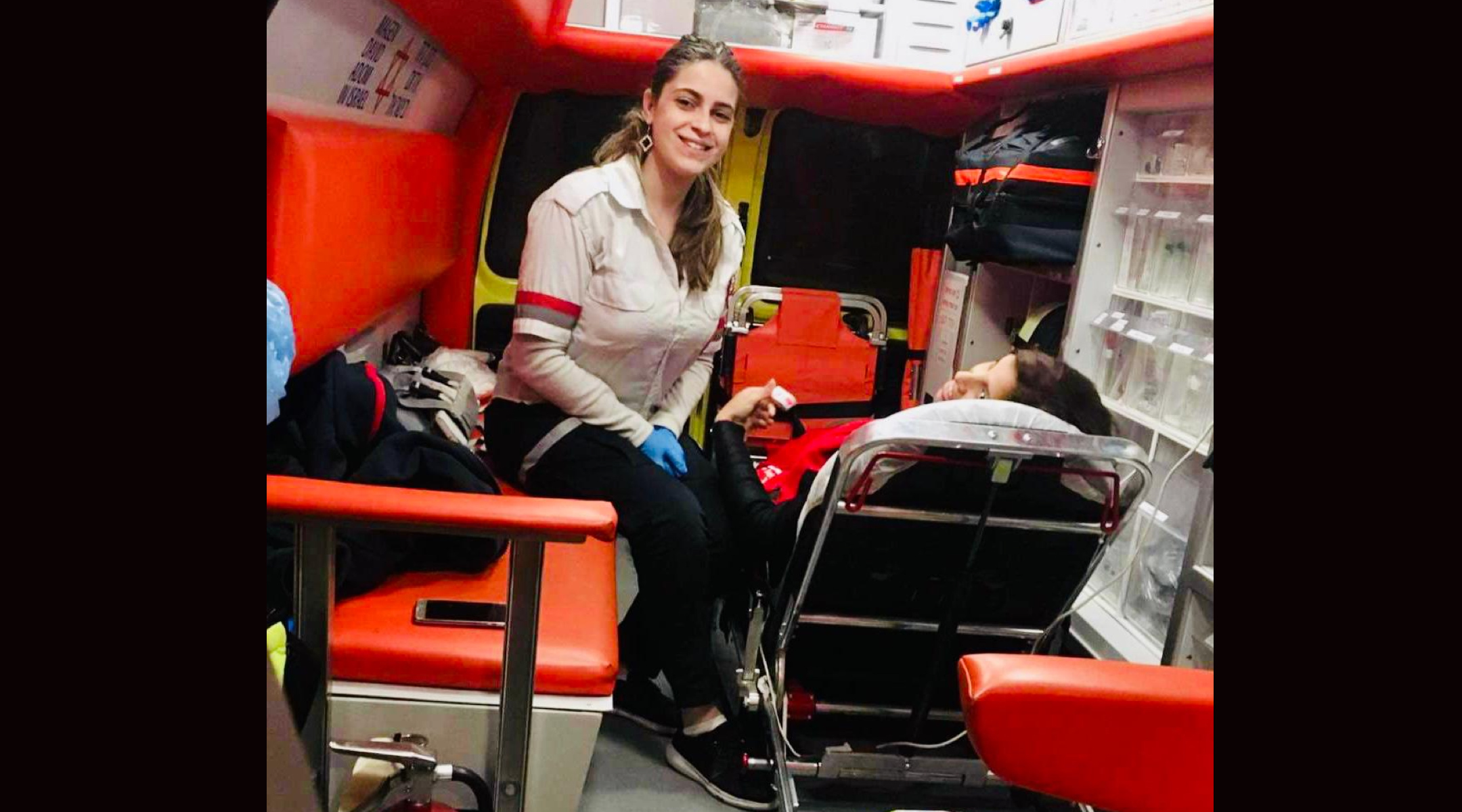
Amit Mann became the youngest paramedics course instructor in Israeli history just months before she was killed on Oct. 7, 2023. (Courtesy Haviva Izikson)
The fear drives Haviva to do everything she can to preserve Amit’s memory — from writing about her regularly on social media, to donating bridal gowns in her honor, to dedicating Torah scrolls in her name (despite professing a crisis of faith since the attack, saying, “I didn’t believe in God beforehand, but if there was a question mark then there isn’t one now”).
Understanding who Amit was before the attack is essential to grasp why “her entire life guided her and prepared her for those hours on Oct. 7,” Haviva said.
Amit was born to David and Rachel Mann a decade after the youngest of her four sisters. As a “caboose baby,” she was doted on by everyone. Haviva, 17 years her senior, recalled the sisters often competing for the chance to bathe and feed her. But it was David who indulged her the most. Haviva described their bond as a “love affair” with David going out of his way to make Amit feel cherished, often serving her dinner on a tray while she watched her favorite TV show.
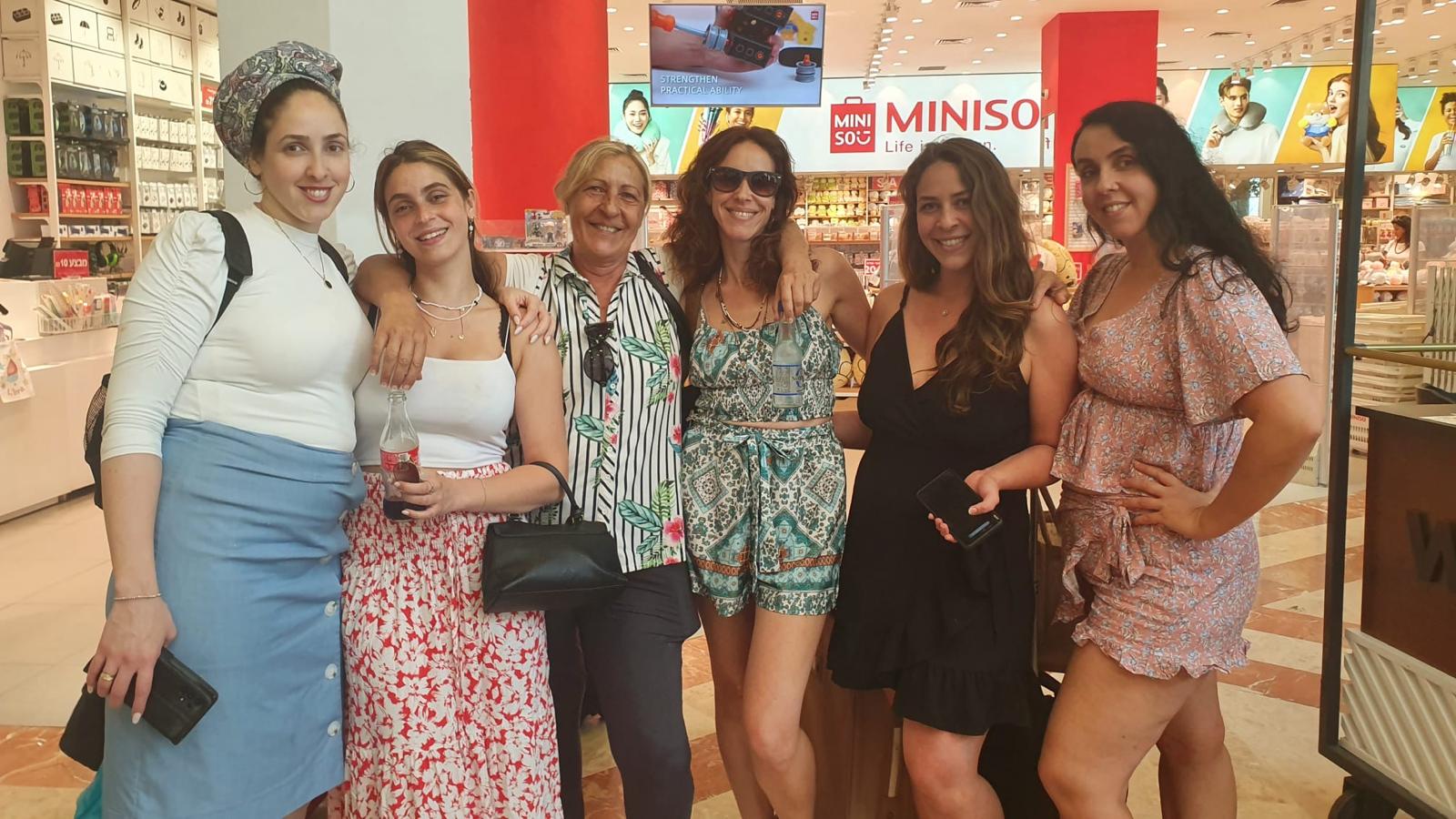
Amit Mann, Haviva Izikson and their sisters pose with their mother in an undated photograph. (Courtesy Izikson)
But when she turned 10, everything changed when David was diagnosed with cancer. The next four years would profoundly shape Amit’s brief life, informing her every decision, including dedicating her life — in the final analysis, quite literally — to saving others.
Driven by the belief that she could save her father, she spent hours at the library, borrowing thick medical textbooks and meticulously sketching the human anatomy. At 14, two years earlier than the typically accepted age, she began volunteering with Israel’s national emergency medical service, Magen David Adom. At 18, she completed the paramedics’ course, and just two months before her death, became the youngest paramedics instructor in the country.
Amit’s love for acting and singing often left her torn between pursuing a career in entertainment or following a path in emergency medical services. But after the death of her father when she was 14, a devastating blow to the entire family, her focus began to shift. At 16, she starred in the lead role in a play at the Beersheba Theater, where actor Oren Cohen described her as “a star who belonged on stage.” Despite her talent, Amit turned down the chance to perform in another production, telling Cohen that “she had decided to follow her dream” and become a paramedic. Later, Keshet TV reached out to her mother, Rachel, urging her to convince Amit to put her paramedic career on hold for a shot at a singing competition on a reality TV show. She turned them down.
Though Amit gave up the chance for a singing career, she never gave up on singing. Haviva recalled how she would come home from long shifts and spend hours in her room singing. Since her death, dozens of clips showing her singing in ambulances have been circulated on social media.
“It was her form of therapy,” Haviva said. Even before Oct. 7, Amit had “saved numerous lives and treated hundreds of patients,” according to MDA’s director of international relations, Yoni Yagodovsky, who noted that she was one of five paramedics murdered that day. After her death, countless people came forward with stories of her kindness, including how she regularly visited grieving families of those she had treated in their final hours. One police officer shared how Amit put her own safety at risk during a terror attack in Beersheba, rushing to help an elderly woman while the attacker was still on the loose.
A producer working on a TV segment about Amit and the events of Oct. 7 remarked wryly to Haviva that her description of her younger sister seemed almost too good to be true.
“He said to me, ‘She’s so perfect, she’s almost flat. We need some depth to her,’” Haviva recalled. “But that’s how I thought of her, even when she was alive — totally perfect.”
On the morning of Oct. 7, as rockets began raining down on Beeri, Amit’s boyfriend, Ofir Peretz, who also worked as a paramedic and lived with her, was due for a shift at an MDA station. Before he left, he asked Amit if she wanted to switch roles so he could stay behind, but she declined. “She told me she felt safe, that two members of the security squad were there to protect her,” he recalled.
Amit rushed to the clinic under fire and spent nearly seven hours treating the wounded, as terrorists overran the area. Throughout the siege, she sent text messages to her sisters, pleading for help and describing the terror unfolding around her.
Haviva has reread the messages every day since — admitting that she can’t fully explain why, but conjecturing that it helps her piece together the events of that day in a feeble attempt to come to terms with what happened.
Amit’s last message reads: “They’re here, in the clinic. I don’t think I’ll make it out of here. I love you.”
It took two and a half days before her body was identified, during which time the family “lost their minds,” Haviva said. But she draws comfort in the fact that, unlike so many other families, they had closure. She also finds solace in knowing their father wasn’t alive to witness it — it would have destroyed him, she said. The two died eight years and eight days apart, a kind of date with infinity, Haviva noted sardonically. When they lowered Amit’s body into the grave, “I felt like they were burying half of my own child. I wanted to go in instead of her,” she said.
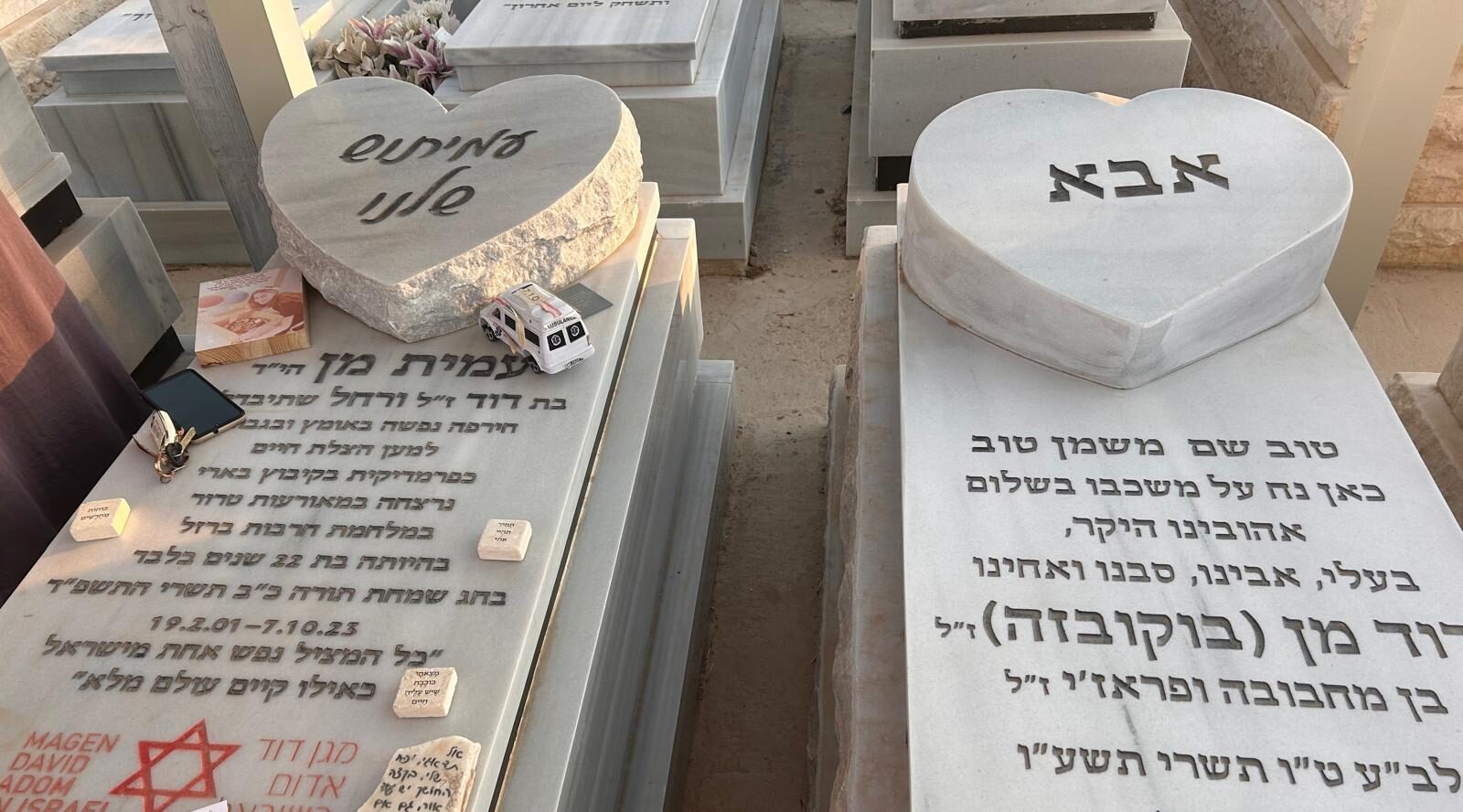
Amit Mann’s grave in Netivot, Israel, is in a plot next to her father’s that had been reserved for her mother. (Courtesy Haviva Izikson)
Echoing the feelings of many Israelis — both the families of victims and hostages as well as the broader population — Haviva said that over the past year, her family has been “reliving Oct. 7 every single day.” She described living in two parallel realities, each with its own sense of time. In one, real time moves forward — days, nights, weeks, holidays, birthdays. The other operates, she said, on an “internal, psychological timeline, where everything is frozen on that day.”
She summed up bereavement with a simple equation: “Grief is basically love. The bigger the love, the bigger the sense of loss.” Some days, like Amit’s birthday, are especially agonizing, as are the days surrounding the first anniversary. “There’s nothing crueler than planning Amit’s memorial. We’re organizing everything—the content, the catering—the only thing missing is her.”
But grief, Haviva explained, can strike without warning, anywhere. “There are no rules. When it hits, there’s not much I can do, it’s so much stronger than me. It comes like a tsunami — there’s no stopping it.”
Parsing her own mourning from the national grief is an impossible task, she said. The threads connecting them are unbreakable, with constant reminders — new deaths, the ongoing hostage crisis — making it impossible to separate the two. The daily anxieties of war, the unrelenting questions about raising children in this reality, weigh heavily. And yet, Amit’s loss remains distinct, overshadowing everything else.
“There is all the rest — and the rest is painful and scary,” Haviva said. “And then there is Amit and nothing else at all.”
JTA has documented Jewish history in real-time for over a century. Keep our journalism strong by joining us in supporting independent, award-winning reporting.
